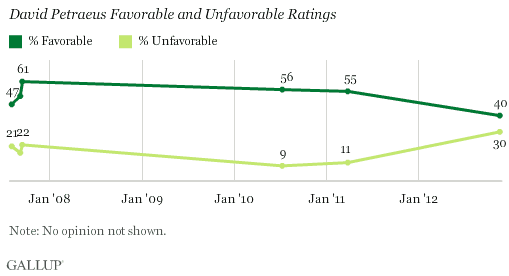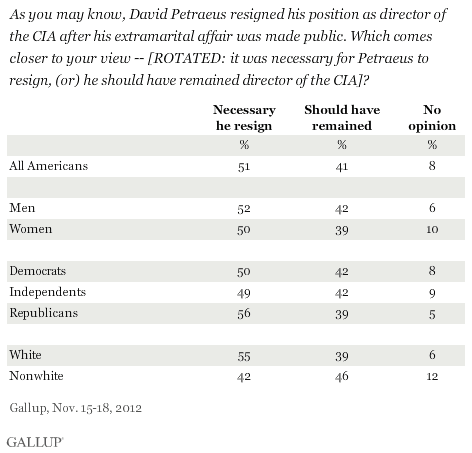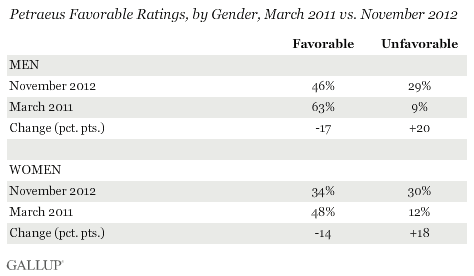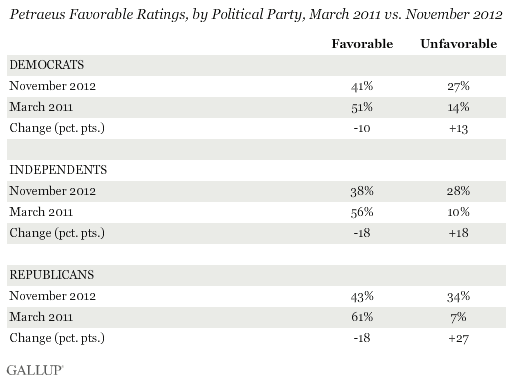PRINCETON, NJ -- Americans view former CIA Director and retired Gen. David Petraeus much less positively now than before the recent scandal that led to his resignation earlier this month, with a 15-percentage-point drop in his favorable rating. Still, more Americans continue to view him favorably (40%) than unfavorably (30%).

The results are based on a Nov. 15-18 Gallup poll, the first taken after Petraeus resigned his position following the revelation of an extramarital affair he was having with his biographer.
Gallup had measured Petraeus' favorable rating five times prior, mostly when he was an active duty general overseeing the Iraq and Afghanistan wars. His favorable rating ranged between 47% and 61% from 2007 to 2011, averaging 54%. Thus, the current 40% rating is his worst by a significant margin.
However, Petraeus' image did not take as severe a hit as John Edwards or Tiger Woods after their extramarital affairs were uncovered. Both Edwards and Woods went from net-positive images to decidedly net-negative images.
Despite the remaining positivity toward Petraeus, a majority of Americans, 51%, appear to back his decision to resign as director of the CIA, saying it was necessary for him to do so. Forty-one percent believe he should have stayed in the position.
There is broad agreement among men and women and among Democrats, independents, and Republicans that Petraeus should have resigned. Whites and nonwhites diverge somewhat, with whites generally believing he should have resigned, while nonwhites are more divided in their views.

Americans are not paying particularly close attention to the news about Petraeus. Fifty-three percent of Americans say they are following the news about the Petraeus matter very (22%) or somewhat (31%) closely. Gallup has asked Americans how closely they are following more than 200 news events since the 1990s, with the average being 61% very or somewhat closely. By way of comparison, 71% of Americans said in a Nov. 9-12 poll that they were following news of the "fiscal cliff" very or somewhat closely.
Those following the Petraeus story very closely believe he should have resigned by a wider 61% to 37% margin.
Gender Gap Evident in Opinions of Petraeus
Currently, 46% of men view Petraeus favorably and 29% unfavorably, while women are more divided, with 34% holding favorable opinions of him and 30% unfavorable ones. Notably, both gender groups have seen similar changes in their ratings since Gallup's last measurement in March 2011; thus, the scandal appeared to affect men and women about equally, but men started out much more positive toward him.

Opinions of Petraeus are quite similar by political party, with all three party groups now showing favorable ratings about 10 points higher than unfavorable ratings. In March 2011, Republicans were much more positive toward Petraeus than Democrats; the closing of the party gap is mainly the result of the disproportionate spike in unfavorable ratings (up 27 points) among Republicans.

Implications
Petraeus has been a significant figure in U.S. foreign policy in recent years, first overseeing the Iraq and Afghanistan wars and then serving as director of the CIA. His career in government now appears over after the revelation of his extramarital affair, and his public image has suffered as well. Still, Americans are more likely to view him positively than negatively, suggesting they may put more weight on his military and political service and accomplishments and less on personal scandal.
Survey Methods
Results for this Gallup poll are based on telephone interviews conducted Nov. 15-18, 2012, with a random sample of 1,015 adults, aged 18 and older, living in all 50 U.S. states and the District of Columbia.
For results based on the total sample of national adults, one can say with 95% confidence that the maximum margin of sampling error is ±4 percentage points.
Interviews are conducted with respondents on landline telephones and cellular phones, with interviews conducted in Spanish for respondents who are primarily Spanish-speaking. Each sample includes a minimum quota of 400 cellphone respondents and 600 landline respondents per 1,000 national adults, with additional minimum quotas among landline respondents by region. Landline telephone numbers are chosen at random among listed telephone numbers. Cellphone numbers are selected using random-digit-dial methods. Landline respondents are chosen at random within each household on the basis of which member had the most recent birthday.
Samples are weighted by gender, age, race, Hispanic ethnicity, education, region, adults in the household, population density, and phone status (cellphone only/landline only/both, cellphone mostly, and having an unlisted landline number). Demographic weighting targets are based on the March 2011 Current Population Survey figures for the aged 18 and older population living in U.S. All reported margins of sampling error include the computed design effects for weighting.
In addition to sampling error, question wording and practical difficulties in conducting surveys can introduce error or bias into the findings of public opinion polls.
View methodology, full question results, and trend data.
For more details on Gallup's polling methodology, visit https://www.gallup.com/.
